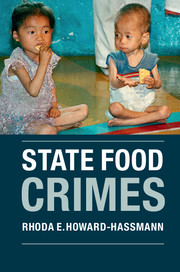5 - Zimbabwe
from Part II - Contemporary Case Studies
Published online by Cambridge University Press: 05 August 2016
Summary
The period 2000–2008 in Zimbabwe is known as the “Zimbabwe crisis.” Unlike North Koreans in the 1990s, Zimbabweans during this period did not suffer widespread famine. However, they did endure widespread food shortages and severe malnutrition, and some people may have starved to death. Although independent Zimbabwe had always suffered from chronic infrastructural problems and periodic drought (Jayne et al. 2006, 533) during the twenty-first century food shortages were principally the result of deliberate government actions and reckless incompetence. The government deliberately manipulated food supplies and international aid to favor its supporters and suppress the opposition. It also instituted a recklessly incompetent and politically motivated system of land reform that undermined national productive capacity. Even if there was no actual famine, the food crime conformed to all four of Marcus’ (Marcus 2003, 46–47) categories of faminogenesis, showing signs of intentionality, recklessness, incompetence, and indifference. Moreover, although the worst of the crisis was over after 2008, similar policies continued through early 2015.
North Korea, one of Zimbabwe's political allies, illustrates what can happen to food production and distribution when a totalitarian dictatorship institutes irrational food policies, combined with complete denial of civil and political rights. Zimbabwe illustrates what can happen when a formal democracy descends into authoritarian dictatorship, progressively undermining civil and political rights and the property laws that had previously facilitated the efficient production, distribution, and acquisition of food.
Historical Background
Formerly a British colony, Zimbabwe became independent in 1980. Its population consisted of two major ethnic groups, the Shona, about 80 percent of the population, and the Ndebele, about 10 percent. About 5 percent of the population was white at independence, reduced to less than 1 percent by 2000 and 0.5 percent by 2007 (Bourdillon 2008, 333–34).
In 1889 the British South Africa Company, a private corporation controlled by Cecil Rhodes, took power over Southern Rhodesia, now Zimbabwe. With good arable land and a climate conducive to European settlement, Southern Rhodesia became a settler colony. In 1923 the British government took control, but rather than administering Southern Rhodesia as a formal colony with a Governor responsible to the Colonial Office in London, it granted the settlers a form of political autonomy that excluded the much larger African population from political affairs.
- Type
- Chapter
- Information
- State Food Crimes , pp. 78 - 95Publisher: Cambridge University PressPrint publication year: 2016



